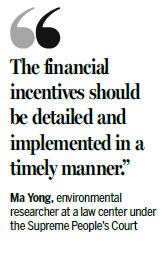Zhengzhou, Henan province, which is among the 10 Chinese cities with the worst air pollution in 2015, has begun imposing heavy fines on its districts and counties of 500,000 yuan ($77,300) for each unit per cubic meter.
The city is among an increasing number that are using financial pressure to control air pollution.
The provincial capital's interim measures to improve air quality, which took effect on April 1, set an annual ceiling for PM2.5 of 79 micrograms per cubic meter or less on average, and a PM10 target of 150, the city government said.
PM 2.5 refers to particulate matter with a diameter of 2.5 microns or less that can be hazardous to human health. PM10 is fine particles up to 10 microns in diameter.
If pollution rises above the ceiling, the district or county will be fined 500,000 yuan in its annual assessment. Conversely, bonuses will be paid for good performance.
Under the interim measures, the city government will pay a district or county that reduces particles by 1 microgram per cubic meter 500,000 yuan per microgram.
In addition, based on monthly assessments, the two best-performing areas among the total 15 district-level entities in Zhengzhou will receive up to 1 million yuan. The bottom two will be fined another 1 million yuan, it said.
Zhengzhou, which is listed in the bottom 10 for air quality in 2015, has joined other domestic cities to adopt financial incentives and punishments for pollution control performance.
Yibin, Sichuan province, issued similar incentives and penalties earlier. Districts there will be fined 300,000 yuan per unit if PM2.5 rises above the annual target, according to rules that took effect on Jan 1. Collected fines will be used to finance air pollution control projects.
Other provinces and cities have also implemented assessment measures since 2015. In November, Guiyang, Guizhou province, fined 10 districts and counties nearly 9 million yuan for their poor performance on air pollution.
"Such clear stipulations about monetary punishments for local governments are a good way to force them to take effective control of air pollution," Ma Yong, an environmental researcher at a law center under the Supreme People's Court, said.
"The financial incentives should be detailed and implemented in a timely manner instead of making them annual actions, which may discount their influence," Ma said.

